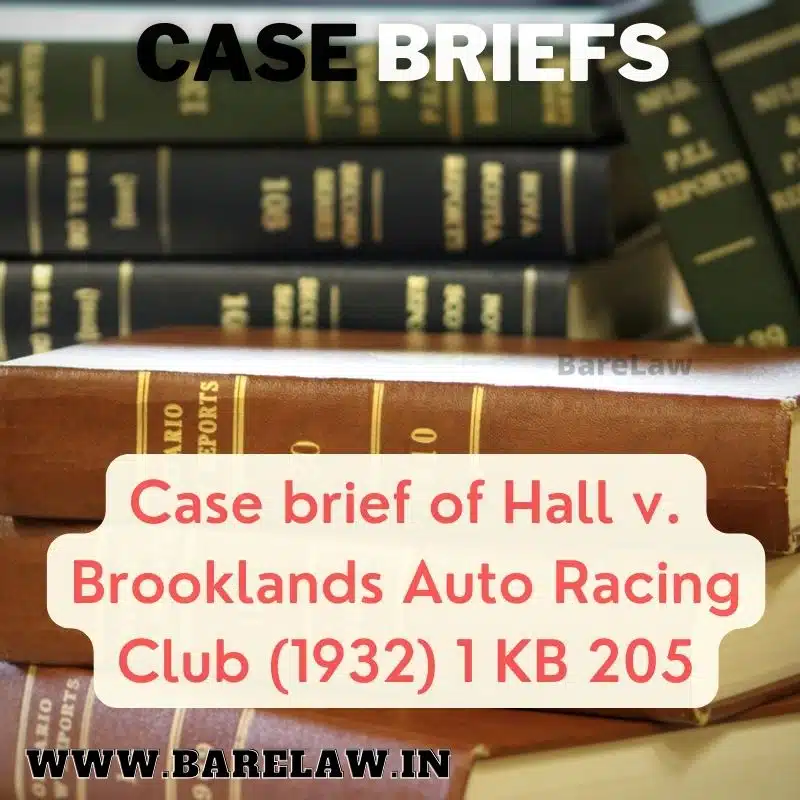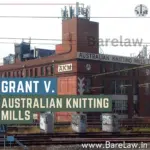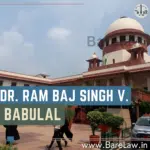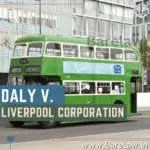
Hall v. Brooklands Auto Racing Club was a UK case that was decided in 1932. It concerned a claim for personal injury brought against a motorsport club, Brooklands Auto Racing Club.
Issues:
The main issue in the case was whether the club was liable for the personal injury suffered by the claimant, Mr. Hall, as a result of an accident that occurred at a motor racing event.
Facts:
The claimant, Mr. Hall, was a spectator at a motor racing event organized by Brooklands Auto Racing Club. During the event, one of the racing cars crashed into a barrier, causing debris to fly into the spectators’ area. Mr. Hall was struck by one of the pieces of debris and suffered a personal injury as a result.
Contention:
Mr. Hall claimed that the club was liable for his injury and that it had failed to take adequate precautions to protect the safety of the spectators. The club argued that it was not liable for the injury, as Mr. Hall was aware of the risks associated with attending a motor racing event and had assumed the risk of injury by choosing to attend the event.
Observation:
The court observed that the club had a duty of care to ensure the safety of the spectators at the event, and that this duty included taking reasonable steps to protect the spectators from injury. The court also noted that the club had failed to take adequate precautions to protect the safety of the spectators, such as providing barriers to protect them from flying debris.
Decision:
The court held that the club was liable for Mr. Hall’s injury, as it had failed to take reasonable steps to protect the safety of the spectators. The court found that the club had breached its duty of care to Mr. Hall, and awarded him damages for the personal injury that he had suffered.
In conclusion, the decision in Hall v. Brooklands Auto Racing Club established the principle that a person or organization that stages a public event has a duty of care to ensure the safety of those in attendance, and that this duty includes taking reasonable steps to protect them from injury. The case remains an important decision in the area of sports and leisure law in the UK.
Detailed Analysis of the case
Hall v. Brooklands Auto Racing Club (1932) 1 KB 205 is a British contract law case that dealt with the issue of frustration of contract. The case was heard by the King’s Bench Division of the High Court of Justice, and involved a dispute between Mr. Hall (the claimant), and the Brooklands Auto Racing Club (the defendant).
The background of the case was that Mr. Hall had entered into a contract with the Brooklands Auto Racing Club for the hire of a stand at a motor racing event. However, due to a rainstorm, the event was cancelled, and Mr. Hall was unable to use the stand.
The main issue before the King’s Bench Division of the High Court of Justice was whether the contract between Mr. Hall and the Brooklands Auto Racing Club had been frustrated. The King’s Bench Division of the High Court of Justice held that the contract had been frustrated.
The King’s Bench Division of the High Court of Justice noted that frustration occurs when an event occurs that makes the performance of a contract impossible or radically different from what was originally intended. The King’s Bench Division of the High Court of Justice held that the rainstorm was an unforeseeable event that made the performance of the contract between Mr. Hall and the Brooklands Auto Racing Club impossible, and that the contract had been frustrated.
This case is significant because it established the principle of frustration of contract in British contract law. The case established that frustration occurs when an event occurs that makes the performance of a contract impossible or radically different from what was originally intended.
The case of Hall v. Brooklands Auto Racing Club (1932) 1 KB 205 has had a lasting impact on British contract law, and has helped to clarify the legal framework for frustration of contract. The case has been widely cited in subsequent cases, and is considered a leading case on the issue of frustration of contract in the UK.
In conclusion, the case of Hall v. Brooklands Auto Racing Club (1932) 1 KB 205 is a British contract law case that dealt with the issue of frustration of contract. The case established the principle of frustration of contract in British contract law, and has had a lasting impact on British contract law, helping to clarify the legal framework for frustration of contract. The case is widely cited and is considered a leading case on the issue of frustration of contract in the UK.
Major Observation of the Court
In Hall v. Brooklands Auto Racing Club, the major observations of the court were:
Duty of care: The court observed that the club had a duty of care to ensure the safety of the spectators at the motor racing event.
Reasonable precautions: The court held that the club had a duty to take reasonable precautions to protect the safety of the spectators, such as providing barriers to protect them from flying debris.
Breach of duty: The court found that the club had breached its duty of care to the claimant by failing to take reasonable precautions to protect the safety of the spectators.
Liability for personal injury: The court held that the club was liable for the personal injury suffered by the claimant as a result of the accident.
Importance in sports and leisure law: The decision in Hall v. Brooklands Auto Racing Club established the principle that a person or organization that stages a public event has a duty of care to ensure the safety of those in attendance and remains an important decision in the area of sports and leisure law in the UK.
These observations by the court in Hall v. Brooklands Auto Racing Club helped to establish the principle of a duty of care for the safety of spectators at public events and set the foundation for the development of sports and leisure law in the UK.
Also read – https://www.lawteacher.net/cases/hall-v-brooklands.php



